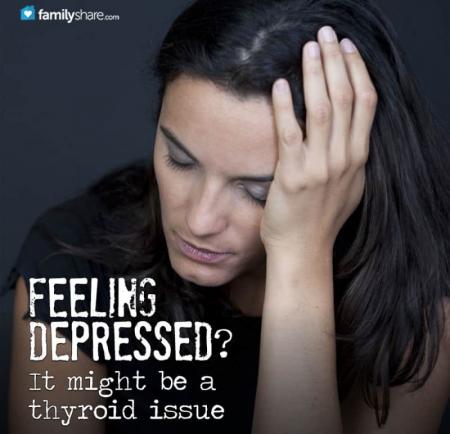
It is a miracle that I found out I had thyroid problems. It was after I had given birth to my second child and life simply was not what I had envisioned. I was constantly battling fatigue. I was depressed. I was tired after what should have been a restful night's sleep and I found myself taking naps throughout the day whenever I could find a chance. My recovery after having my first child was easy compared to what I was dealing with. It was difficult enough to care for a newborn and a toddler, but throwing this into the mix was making it nearly impossible to be the mother that I wanted to be.
After weeks of struggling and discussing possible options with my husband, we decided it would be best if I visited a licensed counselor to receive advice and try to figure out what exactly was going on. A handful of my family members had dealt with depression so I was ready to face that possibility also and begin my journey to recovery.
After a few visits with my counselor, she was stumped. She explained to me that I did not have the usual symptoms of depression and was convinced that it had to be something else. A few questions later, she asked me a life changing question: "Have you had your thyroid checked before?" I had no idea what a thyroid was, but after her explanation, I immediately felt a glimmer of hope. When my tests came back positive for hypothyroidism, I was happy to finally have an answer.
Since then, I have visited with multiple doctors and learned that I also have Hashimoto's (an auto-immune disease). I am much more empathetic toward those dealing with any type of disease, especially auto-immune disorders.
It is estimated that 59 million people have a thyroid problem - many are not aware of it. If you feel like something is holding you back from becoming the mother or father that you want to be (but you can't put your finger on what it is) here are some of the most common thyroid symptoms:
Fatigue
Unexplained weight gain or loss
Depression and/or anxiety
Cholesterol problems
Dry hair and/or skin
Constipation
Impaired memory
Increased sensitivity to hot or cold temperatures
Thyroid problems affect people in different ways. Therefore, people have different ways of coping. I had a difficult time doing the things that I wanted to do as a mother. But it wasn't until my miscarriage that I fully understood the impact that my thyroid could have on my current family as well as my unborn children.
While trying to cope with my miscarriage, I stumbled upon some information that linked thyroid problems to miscarriages. Then I discovered HypothyroidMom, where she talked about a study conducted on 1,000 pregnant women in their first trimester in India. According to the study's lead author Jubbin Jagan Jacob, M.D., "The study found that even mild thyroid dysfunction could greatly increase the risk of serious problems. Women with mild thyroid dysfunction had double the risk of miscarriage, premature labor or low birth weight as compared to pregnant women with normal thyroid function. They also had seven times greater risk of still birth."�
Bringing children into our families can be a difficult process, and with thyroid problems (especially if it's undetected) the process can be that much more stressful. Do yourself, and your family, a favor and visit a doctor if you suspect that you have thyroid problems.
I realize that those dealing with thyroid issues will discover their conditions differently, but because it took me such a long time to come to a conclusion, I hope that I can help you enjoy full recovery sooner than I did.
If you suspect that your thyroid is causing you problems, here are some things you can do immediately to improve and speed up recovery:
Go Gluten-free
It seems to be a "trendy" thing right now, but for those with thyroid problems, gluten can be a key player in determining how you feel; for better or for worse. Try going a few days without eating any gluten (I promise it can be done!) and evaluate how you feel. I didn't think I had any problems with gluten until I went off of it and then I realized that I had gotten used to feeling bloated and having stomach pains all throughout the day. Either way, it's worth a shot. If you'd like more information, Chris Kresser wrote an informative article on how gluten and thyroid are connected.
Exercise
If you are anything like I was before my thyroid levels were under control, the last thing I wanted to do was exercise. But this simple, daily activity may help out much more than you think. Start small and slowly increase your daily workout to get those endorphins flowing! Your body will thank you.
Avoid blaming yourself
For the longest time, I felt like the world's worst mother. I did not feel like myself and I figured that I just wasn't cut out to be a mom. This is where I wish I could rewind and do things differently. If you don't feel like yourself, and especially if you have some of the symptoms mentioned above, cut yourself some slack and realize that it is not your fault. Talk with a family member or visit with your doctor to discuss options for recovery.
I definitely still have bad days here and there as a mother (who doesn't?) but overall, I feel like I have improved significantly and there is no way to quantify the blessing that it has been in my life, as well is in the lives of my family members.
Being "present" in my children's lives is something that I value and hope to pass on to my children. And thanks to a question asked of me by my counselor, I am able to do just that.

